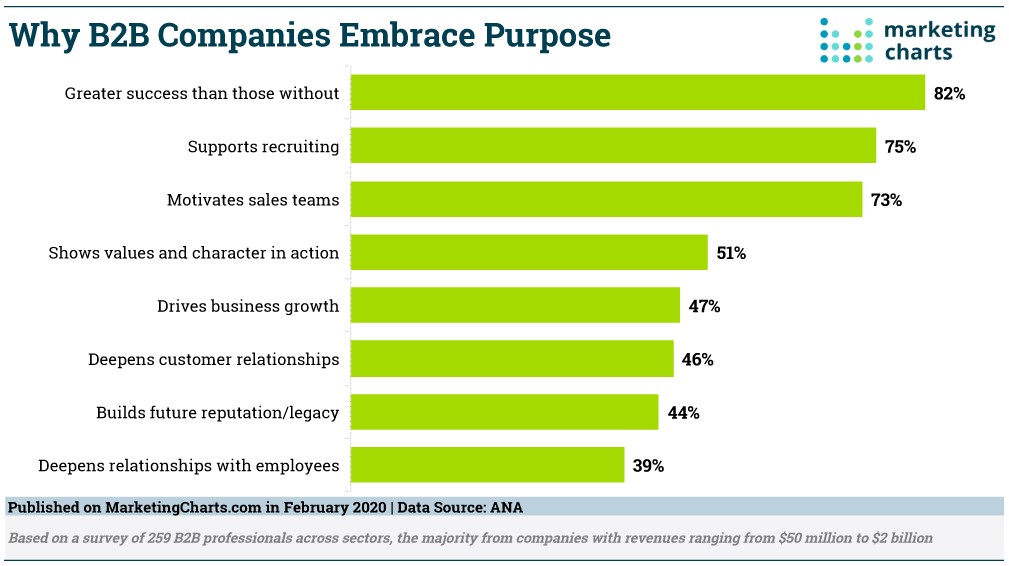Customer loyalty and growing strong customer relationships are an important component of marketing strategy, especially for B2B (Business to Business) companies. An often forgotten or underrated aspect of business that should be considered is your company's purpose. Aside from your mission statement or vision statement, purpose provides a foundation for being that helps answer the "why" of working with your company.
Mission and vision statements act like guide rules for how your company lives and the values your company adheres to. When you bring purpose into the equation, it becomes a driver for existence beyond revenue and profits. Purpose reflects how a business contributes to society with impact; how the growth of your business within a community also drives the success of both your business and the community.
ANA Survey On B2B Purpose
A recent report by the Association of National Advertisers (ANA) revealed "86 percent of B2B companies embrace purpose as important to growth, but they are still on the path to implementing purpose so that it influences business and social outcomes. Only 24 percent said purpose is embedded in their business to the point of influencing innovation, operations and their engagement with society."
The organizations contributing to the report, called "The B2B Purpose Paradox," include ANA, The Harris Poll and Carol Cone On Purpose.
Several key takeaways from the study are interesting to note:
- Financial services, insurance and professional services sectors lead in purpose, while manufacturing and telecommunications lag among the five industries surveyed in the study. (Note the human connection among financial, insurance and professional services vs. manufacturing and telecommunications. The former, collectively, have ability to develop customer connections that lead to purpose-centric businesses.)
- The majority of B2B purchasing decision-makers choose to source from purpose-centric companies with a well-articulated purpose and are willing to pay more for their products and services.
- Business growth is a reason to embrace purpose, yet survey respondents say it's not as effective as earning new customers or generating leads.
- While some feel their company does well communicating purpose, they don't feel they are having a significant impact on society.
Is Purpose Merely Public Relations?
Essentially, the subject of purpose points company leaders to the softer side of business. Some reflect that exploring purpose feels too oriented to public relations, while others recognize that orienting company culture and innovation towards purpose builds relationships with customers, guides decisions, positively impacts society, and also helps bring in a premium for products and services.
In the study, there was overwhelming support for the role of purpose in B2B organizations:
- 87 percent feel purpose protects the company's reputation
- 75 percent say purpose supports recruiting
- 75 percent agree prioritizing purpose had a positive impact on growth
- 64 percent feel purpose is critical or nearly critical to everything they do

Employees Also Benefit From Purpose-Driven Companies
Besides all the benefit purpose brings to B2B companies relationships with community and customer, another audience segment benefits, too: employees.
When employees work within a company culture that cares enough to look beyond profits and revenue generation, then morale is positively influenced, as well. Employees who appreciate the company they work at become goodwill ambassadors for the company. They share good news; they snap and post pictures to social media of the company picnic with everyone having fun; they're loyal; they make it a good place to work for recruits; and, they also feel like their voices are heard.
According to Edelman's Trust Barometer from its global survey of 34,000 adults across 28 global markets, the public is more likely to find a regular employee (54%) to be very/extremely credible than a CEO (47%) or financial industry analyst (47%).
Fostering Purpose in B2B Companies
Fostering a culture of positivity with purpose requires a leadership team that believes in a culture of purpose. Without that direction, business units are not working in tandem to communicate with teams about why a company exists beyond making a profit.
What can your company do to activate purpose and reap positive benefits beyond just profits?






Leave a comment